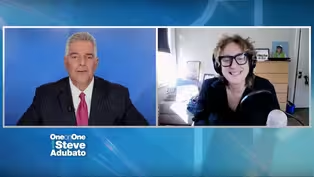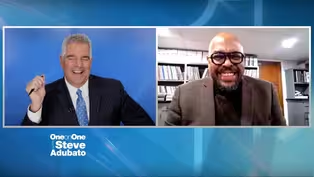One-on-One
Implementing Culturally Sensitive Practice in Medicine
Clip: Season 2023 Episode 2604 | 6m 30sVideo has Closed Captions
Implementing Culturally Sensitive Practice in Medicine
Steve Adubato sits down with Hee Yang, MD, Chief Medical Officer of Asian Health Services at Holy Name Medical Center, to explain the importance of culturally sensitive practice in medicine.
Problems playing video? | Closed Captioning Feedback
Problems playing video? | Closed Captioning Feedback
One-on-One is a local public television program presented by NJ PBS
One-on-One
Implementing Culturally Sensitive Practice in Medicine
Clip: Season 2023 Episode 2604 | 6m 30sVideo has Closed Captions
Steve Adubato sits down with Hee Yang, MD, Chief Medical Officer of Asian Health Services at Holy Name Medical Center, to explain the importance of culturally sensitive practice in medicine.
Problems playing video? | Closed Captioning Feedback
How to Watch One-on-One
One-on-One is available to stream on pbs.org and the free PBS App, available on iPhone, Apple TV, Android TV, Android smartphones, Amazon Fire TV, Amazon Fire Tablet, Roku, Samsung Smart TV, and Vizio.
Providing Support for PBS.org
Learn Moreabout PBS online sponsorship(upbeat music) - Hi everyone, I'm Steve Adubato.
We kick off today's program with Dr. Hee Yang, Chief Medical Officer of Asian Health Services at Holy Name Medical Center.
Good to see you, Doctor Yang.
- Hello Steve, how are you?
- I'm doing great.
Could you describe your role, and why it matters so much?
- Well, you know, my role is to help coordinate and direct Asian health programs services, which is primarily to take care of our patients.
- Okay, so, to be really clear, the Asian community has been affected, negatively affected, particularly since COVID, in terms of medical and healthcare.
What are the most pressing needs, medical needs of the Asian community?
- First of all, when the COVID started, you know, the Asian Health Service was started about 15 years ago to help patients with cultural and linguistic differences.
As you know, going to hospital, and seeing guys like me is very intimidating.
And if you add the language barrier to that, it's, it's unbearable.
So we started that program where we put staff in place to help patients navigate through the hospital, through translation and also personally handle them through the whole hospital visit.
And during the COVID, what had happened was patients were not allowed to bring any help with them.
Because a lot of, when these patients who don't speak the language, they come in with people who are able to translate for them.
But during COVID, we had to limit the number of people coming in.
So these elderly Asian patients were coming in and being dropped off at the hospital, by themselves which made our services that much more valuable and important.
So at that time, we focused on providing personalized services to all these patients, by meeting and greeting them at the door, and help them navigate through the hospital by staying with them through their entire visit.
- Doctor, Bergen County has a very large, large Asian population, correct?
- Correct.
- And also, let me disclose that Holy Name is an underwriter of our programming.
So, let me be clear on this, language is an issue, culture is an issue, not being able to have family members, an issue.
And also not having clinical professionals who look and can communicate in a fashion, in a language that is understandable to a patient.
Am I overstating that doctor?
- Well, that is absolutely correct.
However, there's an additional layer in that there are some disease processes and illnesses that are different in the Asian community.
- For example?
- For example, there's higher incidences of gastric cancer.
It has to do with the fact, it has to do with genetics, and diet and, and socioeconomic condition.
So those, those Koreans that grew up to adulthood and came to United States brought the same disease pattern from Asia or Korea to United States.
Therefore, they have much higher incidents of gastric cancer.
So what we do is, as a community at large, is that when Korean adult comes in with some sort of abdominal discomfort, we have very short, very quick trigger to perform endoscopy, which is the best way to detect stomach cancer.
So for example, if in the Korean community, we have, let's say about, early detection rate is about 70, 80%.
Meaning patients are seen and endoscoped prior to developing clear symptoms, which indicates that they have gastric cancer.
Whereas in non-Korean community, the early detection rate is much lower because of index of suspicion is very, very much lower.
And that's one example of how the disease pattern differs in United, in Asians versus non-Asians.
And by having an Asian health program, could bring everybody together into a single, concentrated area where these patterns become obvious and apparent where we could do something about it.
- You know, people think that healthcare and clinical care is, first of all, it's complex enough just because the diseases and the issues that people are dealing with are complex.
The the whole process is complex.
You add to that ethnic and cultural issues, barriers, challenges, and it really is incredibly important, the work that you and your colleagues are doing.
So, Doctor Hee Yang, Chief Medical Officer of Asian Health Services at Holy Name Medical Center.
Doctor, I wanna thank you so much for joining us.
- Thank you Steve.
Thank you for having me.
- You got it.
Stay with us, we'll be right back.
- [Narrator] One-On-One with Steve Adubato has been a production of the Caucus Educational Corporation.
Funding has been provided by TD Bank.
Rutgers University Newark.
PSEG Foundation.
Newark Board of Education.
The New Jersey Education Association.
New Jersey Sharing Network.
The Port Authority of New York and New Jersey.
The Fidelco Group.
And by The Russell Berrie Foundation.
Promotional support provided by New Jersey Globe.
And by BestofNJ.com.
- (Narrator) New Jersey is home to the best public schools in the nation, and that didn't happen by accident.
It's the result of parents, educators and communities working together year after year to give our students a world class education.
No matter the challenge, because parents and educators know that with a shared commitment to our public schools, our children can learn, grow and thrive.
And together, we can keep New Jersey's public schools the best in the nation.
Does Political Correctness Inhibit Free Speech?
Video has Closed Captions
Clip: S2023 Ep2604 | 11m 8s | Does Political Correctness Inhibit Free Speech? (11m 8s)
Jazz Bassist Discusses TD James Moody Fesitval
Video has Closed Captions
Clip: S2023 Ep2604 | 10m 3s | Jazz Bassist Discusses TD James Moody Fesitval (10m 3s)
Providing Support for PBS.org
Learn Moreabout PBS online sponsorship
- News and Public Affairs

Top journalists deliver compelling original analysis of the hour's headlines.

- News and Public Affairs

FRONTLINE is investigative journalism that questions, explains and changes our world.












Support for PBS provided by:
One-on-One is a local public television program presented by NJ PBS

